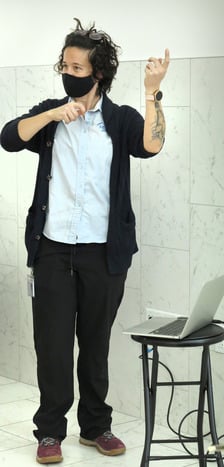St. Michael students benefit from Applied Behavior Analysis
-
 By Christine Bordelon
By Christine Bordelon
Clarion Herald
The small, 7 to 1 student-teacher ratio at St. Michael Special School got even smaller in August when the school began collaborating with Touchstone ABA to accompany students in the classroom with a variety of special needs, including autism and Down syndrome.
The one-on-one attention from Touchstone was evident in a recent music class held in St. Michael’s newly dedicated chapel. As music teacher Caitlin Preston-Fulton demonstrated sounds of various instruments and showed a dance-movement video to 20 students of all learning levels – beckoning participation – a Touchstone line technician encouraged a student to try the dance steps.
This student is among 13 who are taking advantage of Touchstone’s applied behavior analysis (ABA) individualized learning plans. There is a waiting list for the program, said Dr. Francis Hwang, Touchstone site manager at St. Michael Special School.
Several students in the Touchstone program, but not all, have autism. Others might just need help adapting to different environments throughout the day or they have cerebral palsy, emotional or behavioral challenges, attention deficit or hyperactivity disorder (ADHB), she said.
Some students are allotted as many as 30 hours a week with Touchstone line techs, she said, but higher-functioning students might need only seven.
“We don’t look at the diagnosis, we look at the challenges,” Hwang said. Successes are applauded. Hwang gave an example of one client who, when first introduced to Touchstone, would ask for things using only one word.
“If he wanted some milk, he would say ‘milk,’” Hwang said. “So, what we did was build on his language. We taught him, ‘Milk, please.’ Once he mastered that, we added another word: ‘Want milk, please.’”
Building on those skills, a little at a time, broken down into achievable goals, he can now, without prompting, say, “I want milk, please.”
Hwang said it’s all about meeting the classroom needs of each student individually. An initial assessment determines self-management goals, but its flexibility allows changes instantly, if necessary. Each student is formally evaluated every three to six months.
“I go in the classroom and devote at least an hour per student a week,” Hwang said. “It’s an ongoing assessment, ongoing supervision and revision of programs. We have a system where we train our line techs to bring the data to me and make decisions based on research, so we don’t waste the clients’ time and so we can teach them more efficiently. Our goal is to help students be a member of society without us.”
 Improvement is measurable
Improvement is measurable
Dr. Cissy LaForge, St. Michael’s head of school, said when educators understand what students need, more educational advancements can be made in a classroom. That’s been the beauty of having Touchstone on campus.
“They can shape behavior because they are on it,” LaForge said. “Dr. Francis is in and out of the classroom all day and can readjust the plan immediately,” allowing teachers to teach.
“Overall, there is less classroom disruption (and kids being pulled out of the classroom for behavior issues), because you have somebody on it immediately,” LaForge said. “With one teacher and one aide in a classroom, a teacher might have been devoting her time to one or two students with issues (before Touchstone’s ABA services). Now, our teachers can really focus on the educational core a little more.”
Because each student’s needs are so individual, LaForge said some students will have the line techs in the morning to get settled to allow more focus and learning readiness. Others might need a line tech for P.E. or music, because it is more challenging for them. Everything is recorded, and improvement is tracked. Parents are given constant feedback.
“Every day, there is a back and forth with the family,” LaForge said.
LaForge, who is in her second year as head of school, mentioned how Touchstone has even improved her interaction with students.
“It helped my learning curve,” she said. “I didn’t always understand why a student does a certain thing. Touchstone helps me get a deeper understanding of our kids and how to interact more productively with them.”
LaForge said St. Michael Special School sought Touchstone because many younger students, mostly with autism, arrived at St. Michael from a clinical setting, not a preschool environment, and lacked the habits expected in an ordinary classroom.
“They didn’t come out of a typical preschool program where you learn how to share, sit in a chair, feed yourself, the potty, etc.,” LaForge said.
“They didn’t have those typical skills. We needed something to transition the kids in and shape their behavior in a school setting.”
LaForge said it also gives parents a choice for extra help in the classroom. In addition, St. Michael contracts with long-time providers Crane Rehab Center for special student needs.
“The kids need this support,” LaForge said. “It’s like intensive care. When you are in intensive care, all the specialists are on you and are constantly talking to each other on how to get you up and running. We should have this, especially when they are little. If we put all these resources on them early, we hope we can have a better long-term outcome for our kids. It will be less frustrating for them, they will adapt to school sooner, their social skills – interacting with others – will grow rapidly.”
Touchstone ABA mainly works with students through middle school but offers an after-school program for all ages at St. Michael. Parent involvement is encouraged, and monthly parent education meetings are available. Touchstone works in schools and clinics in Thibodaux, Houma, New Orleans, Hammond, Baton Rouge and Lafayette.
“We hope they will work themselves out of a job of working with that one student and pick up another,” LaForge said.
[email protected]
